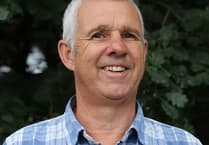The authoress who put the Forest of Dean on the literary map, Winifred Foley, died aged 94 last week. Her death occurred just as her perennial best-selling A Child in the Forest was being re-released this week on its 30th anniversary.
The book now renamed Full Hearts and Empty Bellies: A 1920s Childhood from the Forest of Dean to the Streets of London was originally published in 1974 when Winifred was already 60. The BBC Woman's Hour programme asked for listeners' reminiscences, and Winnie had already begun jotting her childhood memories.
Her memoirs were so lively the producers arranged for the BBC to publish them as a book. The narrative was so sparkling that there were suggestions ever after that she couldn't have written it herself.
"I know from publishing her second book that she was perfectly capable of writing herself," Coleford's Forest Bookshop owner and publisher Doug McLean tells the Review. "Like any manuscript it probably benefited from editing, but the talent was all hers"
Woman's Hour this week broadcast a recent interview prepared for the 30th anniversary of the publication as a tribute to her memory.
Winifred was born in the hamlet of Brierley near Cinderford as Margaret (Peg) Mason in 1914. Her father was a miner, mostly self-educated and thoughtful.
Blacklisted by mine owners for his role in the 1920s strikes, he found work hard to come by. So the family suffered even greater hardship than the generality of mining families in that decade.
The women of the families had to be as tough as the men. Much of Winnie's early narrative is of her mother's humiliation in cadging from (mostly sympathetic) shopkeepers and tradesmen.
Like others, the family depended on their cottage back garden for vegetables and fruit – and the pig. Child is the first impressionistic account of the importance of the pig for winter food in the local domestic economy. The surrounding woodlands also offered wood for the small range providing heat, hot water and cooking.
She also captured the unique local dialect and vernacular phraseology. A typical line from her small brother during a hot afternoon gathering bracken in the woods is (from memory):"By, but tis as hot as a fresh hoss's ****."
Like other girls, Winifred had no prospect of a job within the Forest. With schooling ending at 14, she like others went off to work as a maid. Many went to Cheltenham, coming back to their families for their Sunday day off.
Sent to London, Winnie was desperately homesick. She was only rescued when, in the 1930s, she gained a job as a maid in a women's college.
And met her future husband. The two were well matched, he stolid and she loquacious. They had four children and returned to Gloucestershire after the war.
After the success of Child of the Forest, she followed it with No Pipe Dreams for Father (1977) and Back to the Forest in 1981. A Child having sold an astonishing half a million copies, the trio were published by the Oxford University Press as The Forest Trilogy (1992).
In recent years she lived as a widow in a Cheltenham flat near to one of her sons and family. Full Hearts and Empty Bellies (Abacus paperback £6.99) is published this Thursday.




